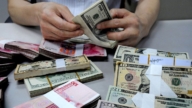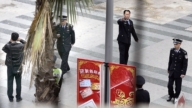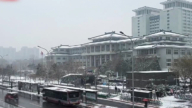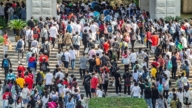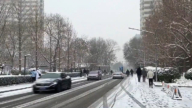【新唐人2011年11月30日讯】经济合作与发展组织最新报告展望,中国房地产市场的波动,将是明年中国经济保持高增长的一大潜在威胁,同时,中国2012年经济增长率将从今年的9.3%下降到8.5%。随着中国大中城市的平均房价下滑,一些专家认为,中国房地产泡沫正在破裂,而中国经济回归实体经济才有出路。
经合组织11月28号表示,房地产市场低迷将会导致中国银行呆坏帐比例上升。与此同时,经合组织预期,2012年中国全年通货膨胀率将从今年的5.6%下降到3.8%,中国明年的出口增长速度将下降到7%。
今年10月份中国70个大中城市新建商品房的环比平均价格,两年多来首次出现下降。主管房地产调控的中共副总理李克强11月25号表示,中国的房地产市场正处于一个关键阶段,即使房地产交易量下降,也仍然要保持给中国房市降温。
纽约城市大学经济学教授陈志飞认为,北京当局可能确实真想把楼市控制住。
陈志飞:“因为楼市一支独秀的话,整个中国经济别的方面都被它掏空了﹔因为楼市其实带来很多负面效应,最大的问题就是社会问题,贫富差距,社会各方面的不满情绪非常普遍。这样楼市如果下来的话,可能对解决通货膨胀在某种程度上还是有利的。”
《纽约时报》报导,在上海,大约有1/6的高级住宅是没有人住的﹔在北京为1/4﹔在深圳附近为1/3。中国房屋的空置率已超过国际警戒线,报导同时质疑中国房地产的泡沫是否已经开始出现破裂。
英国《金融时报》专栏作家叶檀29号发表文章认为,在房地产调控成效刚刚出现的同时,中国房地产调控“定向放松”的迹象也已经显现。
文章列举了南京公积金贷款恢复最高可贷额度、杭州首套房可获补贴20万、北京调整普通住房平均交易价格优惠政策和税收优惠,常州、重庆等各地也出台不同的购房补贴。
叶檀指出,如果房地产投资下滑,将使投资拉动的经济出现快速下行风险。
而《中国经营网》对此发表评论认为,有的地方政府贸然出手救房地产市场是在玩火,客观上在弱化中央政府宏观调控,阻碍中国房价的下降,最终会导致失信于民。
经济学家谢国忠11月11号在财新峰会上表示,今年下半年房地产泡沫已破裂。中国经济重组的开始就是房地产调整,房价高,政府有钱,老百姓没钱,这个经济不可能得到平衡。
美国南卡罗莱纳大学艾肯商学院谢田教授则表示,房地产泡沫破灭会使依赖土地财政的各地方政府失去巨大的利益来源,加重地方债务。
谢田:“实际上泡沫的破灭现在已经开始出现了、正在进行之中,那这样的话,开发商、国有的房地产企业、国有银行他们当年从中攫取的巨大的利益回吐出来,这实际上是既得利益集团跟民间百姓争利的事情,这个问题中共不管出台什么样的政策,都实际上不太可能真正把它调解开的。”
《华尔街日报》引述中共国务院副总理李克强26号的讲话说,中国必须转变经济发展方式﹔不转型,不仅长远发展不可持续,而且当前平稳较快增长也难以保持。
谢国忠指出,中国经济这几年搞不好就是房地产引起的。中国未来几个月房地产企业出现倒闭的时候,如果政府救的话对中国长期来说就是负面,因为又一次证实中国赚钱的模式就是绑架政府、绑架银行,这个经济模式不打破,中国经济是没有出路的。
新唐人记者刘惠、李元翰、萧宇采访报导。
China’s Real Estate Bubble Bursts – Good or Bad?
The latest outlook from the Organization for Economic
Co-operation and Development (OECD) says
China’s real estate market fluctuations are a major threat to
its growth next year.
China’s growth will fall from 9.3% in 2011to 8.5% in 2012.
Along with the decline of the average price for real estate
in large and mid-sized cities, some experts believe China’s real estate bubble is bursting.
Its way out is to return to real economy.
OECD’s report on Nov. 28th, says depression in the
real-estate market will increase the banks’ bad debts.
OECD predicts China’s inflation in 2012 will decline
from this year’s 5.6% to 3.8%.
China’s export increase rate next year will decline to 7%.
The average price of a new house in 70 large and mid-sized
cities declined in October for the first time in more than 2 years.
Chinese vice Premier, Li Keqiang, in charge of
the real estate regulation, said on Nov. 25th that China’s real estate market is at a critical stage.
even with a decline in real estate transactions,
the government is continuing to cool down the housing market.
Professor of Economics at the City College of New York,
Chen Zhifei, thinks the Beijing Authority may really want to control the housing market.
[Chen Zhifei, Professor of Economics, the City College of
New York]: “If the real estate market is too strong,
other areas of the Chinese economy will be taken away.
Real-estate brings many negative impacts,
with the largest being social issues,
such as wide gaps between the rich and the poor,
and dissatisfaction from people in different social classes.
If the real estate market is down, it might solve inflation.
So it is beneficial in certain aspects.”
According to a New York Times report, 1/6 of luxury houses
in Shanghai, 1/4 in Beijing and 1/3 in Shenzhen are empty.
The ratio of empty houses in China has surpassed the
international warning standards.
The New York Times questions whether China’s real estate
bubble has burst.
UK’s Financial Times columnist, Ye Tan, published an article
on Nov. 29th saying that
China’s control over its real estate has loosened,
while the effects are visible in the adjustments.
The Financial Times says: Nanjing’s highest amount of
public debt loan returned to its former level;
Hangzhou’s first house purchase received 200,000 RMB
in credit;
Beijing adjusted the favorable policies on the prices and tax of
average housing;
and Changzhou and Chongqing cities introduced different
credit policies on real estate, etc.
Ye Tan says the decrease in real estate investment
will accelerate the decline of an investment built economy.
China’s www.cb.com.cn published a commentary article,
stating that some local government policies aimed at saving the housing market are like playing with fire.
The policies weaken the central government’s adjustments to
the market and stops house prices from declining —eventually resulting in a loss of public trust.
Economist Xie Guozhong said on Nov. 11th during the
Caixin Conference, that the real estate bubble had burst in the second half of this year.
The re-organization of the Chinese economy started with
adjustments to the real estate, causing high prices, a rich government and public poverty.
It is not possible for this economic model to achieve a
balance in wealth.
Professor at the Aiken Business School, University of South
Carolina, Xie Tian, says the real estate bubble will cause the local government—
who depends on land for its source of income—to suffer
huge losses, worsening the local government’s debt issues.
[Professor Xie Tian, Aiken Business School, University of
South Carolina]: “In fact the bubble-burst has emerged. It is ongoing.
In this case, real estate developers and state-owned real estate
enterprises, and state-owned banks need to spit out the huge profit they made before.
It is actually a battle for profits
between those groups and the people.
Regardless of the policies the Chinese Communist Party
introduces, it is not possible to resolve the issue.”
The Wall Street Journal quoted China’s Vice Premier
Li Keqiang’s speech on Nov. 26th, saying China must change its economic development model;
otherwise its progress will not last, and it will be hard to
maintain the current relatively fast rate of growth.
Xie Guozhong says China’s bad economic situation in
recent years has been down to real estate issues.
When China’s real estate enterprises close down over the
next few months, if the government would save the enterprises,
this would impact China negatively in the long run, once again,
confirming that China’s money-making model is stealing money away from the government and the banks.
The current economic model offers China no way out.
NTD reporters Liu Hui, Li Yuanhan and Xiao Yu





